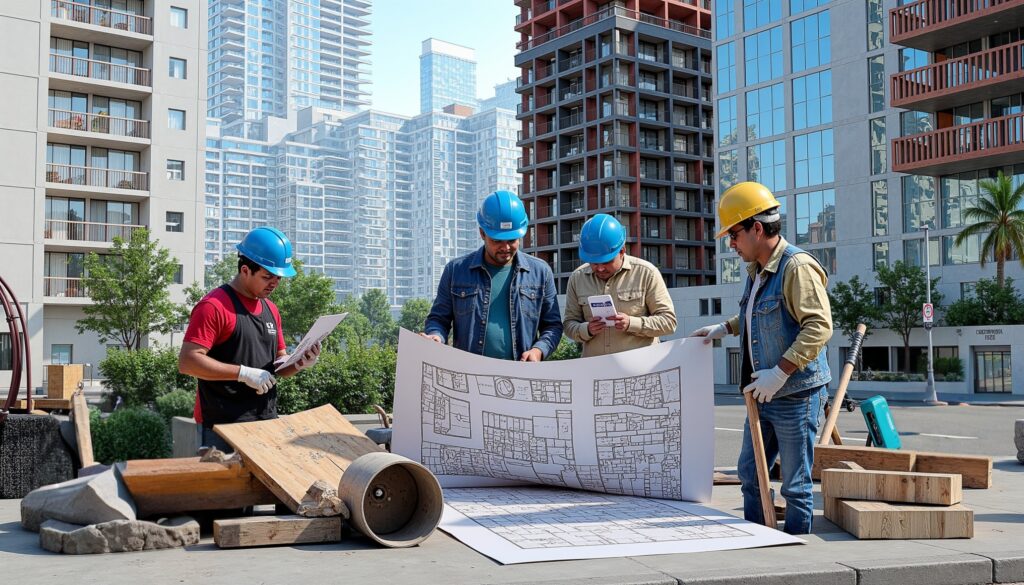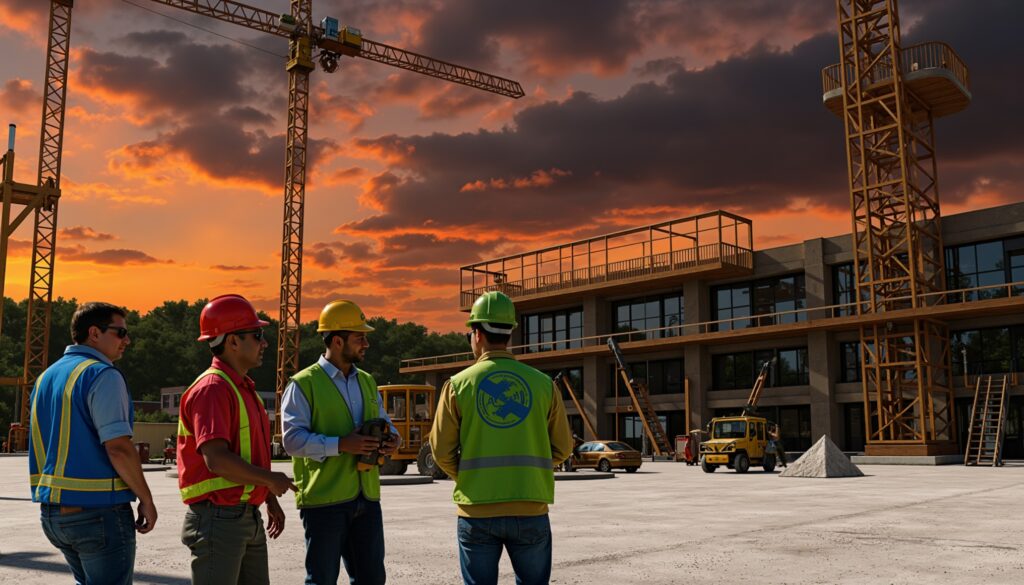Understanding building regulations is crucial for anyone involved in construction or renovation projects.
These regulations are a set of guidelines established by local and national authorities to ensure safety, sustainability, and structural integrity in the built environment.
Without adherence to these standards, projects can face significant delays, legal issues, and financial repercussions.
This essential guide will provide a comprehensive overview of the importance of compliance with building regulations, key regulations to be aware of, the steps needed to ensure adherence, common pitfalls to avoid, and valuable resources for further understanding.
Whether you are a homeowner, contractor, or architect, navigating these regulations will empower you to achieve successful project outcomes.

Key Takeaways
- Building regulations are crucial for ensuring safety and quality in construction projects.
- Compliance with building regulations helps avoid legal issues and costly penalties.
- Key regulations include zoning laws, structural integrity standards, and safety codes.
- To ensure compliance, familiarize yourself with local regulations and follow outlined steps meticulously.
- Common mistakes in compliance can be costly, so utilize available resources to stay informed.
Introduction to Building Regulations
Building regulations in Costa Rica ensure that construction projects are executed safely, sustainably, and in compliance with local laws.
These guidelines are crucial for anyone considering real estate investment in this vibrant country, as they help define what is permissible in terms of design, construction methods, and safety standards.
Understanding these regulations is key to navigating the complexities of the Costa Rican real estate market.
From residential properties to commercial developments, being well-versed in building regulations will not only protect your investment but also ensure that your project contributes positively to the environment and communities in which they are situated.
As a prospective buyer or builder, familiarize yourself with local zoning laws, environmental impact assessments, and the necessary permits required for construction to streamline your process and avoid potential legal setbacks.
Importance of Compliance in Construction Projects
Compliance with building regulations is an essential aspect of any construction project, ensuring that structures are safe, functional, and sustainable.
Adhering to these regulations protects the health and safety of occupants and the general public, and it also helps mitigate legal risks for developers and contractors.
Non-compliance can lead to costly delays, fines, or even the demolition of non-compliant structures.
Furthermore, understanding local building regulations is crucial for ensuring a project’s success, as they can differ significantly by location.
This makes it vital for stakeholders to engage with legal experts and construction authorities throughout the building process to navigate the complexities of compliance effectively.
‘The time to repair the roof is when the sun is shining.’ – John F. Kennedy

Key Building Regulations You Need to Know
When navigating the exciting world of Costa Rica real estate, understanding the local building regulations is essential for both buyers and investors.
These regulations are designed to ensure safety, environmental protection, and community development.
In Costa Rica, the main governmental body overseeing construction is the Ministry of Housing and Human Settlements (MIVAH).
Depending on the municipality, regulations can vary significantly, covering aspects such as zoning laws, height restrictions, and permit requirements.
Additionally, it’s crucial to obtain a construction permit before starting any project, which involves submitting detailed plans that adhere to local building codes.
Familiarizing yourself with these building regulations not only streamlines the construction process but also safeguards against potential legal complications down the road, making your venture into Costa Rica real estate more fruitful.
Steps to Ensure Compliance with Building Regulations
When engaging in construction projects in Costa Rica, understanding and adhering to building regulations is paramount for a successful outcome.
The first step is to familiarize yourself with local zoning laws, which dictate where and how you can build, as these can vary significantly from one municipality to another.
Next, obtain the necessary permits by submitting your building plans to the local government, ensuring they meet all technical specifications and safety standards outlined in the national building regulations.
Hiring a qualified architect or engineer who is well-versed in Costa Rican building codes can streamline this process—ensuring that your project adheres to legal stipulations while enhancing its design.
Additionally, it’s essential to conduct regular inspections during the construction phase to verify compliance with all regulations and to make any necessary adjustments.
By following these steps, you can avoid costly fines and delays while ensuring that your property adheres to the highest standards of safety and quality.

Common Mistakes to Avoid in Building Regulation Compliance
When navigating the complex world of building regulations, it’s crucial to avoid common pitfalls that could lead to significant delays and expenses.
One frequent mistake is underestimating the importance of thorough research; many builders neglect to familiarize themselves with local building regulations, which can vary significantly from one municipality to another.
Another common error is failing to consult with professionals early in the planning process; architects, surveyors, and construction managers can provide invaluable insights into compliance requirements, potentially saving time and money.
Additionally, some individuals underestimate the significance of obtaining the correct licenses and permits before commencing construction; skipping these steps can result in fines and forced project modifications.
Lastly, overlooking post-construction inspections can lead to compliance issues down the line.
By staying informed and involving the right experts, you can effectively navigate building regulations and ensure a smooth construction process.
Resources for Understanding Building Regulations
Understanding building regulations is crucial for anyone looking to invest in Costa Rica real estate, whether you are planning to construct a new home or renovate an existing property.
These regulations ensure that constructions adhere to safety standards and local zoning laws, contributing to community development and environmental sustainability.
Thankfully, there are a variety of resources available to help navigate the complexities of building regulations in Costa Rica.
The local government offices often provide guidelines and documentation that specify the requirements for obtaining construction permits, which are essential before breaking ground.
Additionally, consulting with local architects or construction firms familiar with Costa Rican laws can provide invaluable insights and ensure compliance with all regulatory frameworks.
Online platforms and forums dedicated to expats and real estate investors in Costa Rica can also serve as beneficial resources, offering anecdotal experiences and advice from those who have successfully navigated these regulations.
Investing time in understanding building regulations will not only streamline your construction process but also protect your investment in the vibrant Costa Rican real estate market.
Frequently Asked Questions
What are building regulations?
Building regulations are a set of legal requirements that govern the design, construction, and alteration of buildings to ensure safety, health, and environmental standards are met.
Why is it important to comply with building regulations?
Compliance with building regulations is crucial to ensure the safety of the occupants, uphold public health standards, protect the environment, and avoid legal repercussions or fines.
What are some common building regulations I should be aware of?
Key building regulations include structural integrity, fire safety, ventilation, insulation, accessibility for disabled individuals, and energy efficiency requirements.
What steps can I take to ensure compliance with building regulations?
To ensure compliance, familiarize yourself with local regulations, engage professional architects and builders, obtain necessary permits, and conduct regular inspections during the project.
What are some common mistakes to avoid when ensuring compliance with building regulations?
Common mistakes include failing to check local regulations, overlooking necessary permits, making alterations without proper documentation, and neglecting to conduct thorough inspections.





